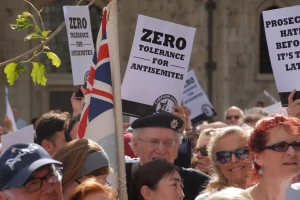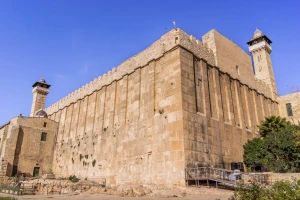Almost half of British population believe UK no longer safe for Jews, according to poll

A new report by British think tank More in Common has found that 44% of British people now believe their country is unsafe for Jewish people.
The research and communication non-profit has been tracking attitudes towards the Israeli-Palestinian conflict since the Oct. 7 massacre, but the new report entitled After Choosing Sides: Britain's changing views on the Israel-Palestine conflict has found that views have diverged over the last two years, and have become more polarized than ever.
Following multiple polls and focus groups, the think tank concluded that “the fallout from the conflict is likely to have lasting effects on attitudes towards civil debate, free speech and our institutions for many years into the future.”
With high-profile incidents, such as the terrorist attack at a Manchester synagogue in which two Jewish people were killed and the Aston Villa vs Maccabi Tel Aviv football game debacle, 44% of those questioned responded that the UK was now either “mostly unsafe” or “very unsafe” for Jews. This statistic represents the highest figure recorded by the think tank since Oct. 7, 2023.
GBNews reported that Jewish people are increasingly choosing to hide their identity by not wearing religious symbols, citing the report’s findings.
The researchers also found that the general public are increasingly intolerant of the weekly demonstrations, stating, "Public patience for protest is wearing thin. Two-thirds of Britons now believe some protests are too disruptive to be allowed, with sustained demonstrations over Gaza contributing to broader backlash against activist movements."
Similarly, the survey revealed that 64% of British respondents disagreed with performer Bob Vylan’s incitement to violence against the IDF last summer, expressing a preference for celebrities and musicians to refrain from politics.
The damning report on BBC bias by Michael Prescott, who served as the independent advisor to the corporation’s Editorial Guidelines and Standards Committee until June this year, has highlighted the growing divide in the UK at every level, as well as the erosion of trust in the public broadcasting body.
The director of More In Common UK, Luke Tryl, confirmed that "divisions over the conflict have seriously strained trust in Britain's media organisations, institutions and politicians."
He continued, "The Government, civil society and those most engaged in the conflict need to do more to find ways out of the growing cycle of polarisation that risks inflicting lasting scars on social cohesion in the UK."
More in Common conducted three extensive surveys, each of around 2,000 Britons, during the month of October. The survey results revealed how seven different groups of people, categorized by political leanings and beliefs, viewed the conflict.
More in Common presents the full spectrum of views from extreme left to extreme right, giving a fuller picture of the British public opinion – something that is hard to ascertain given the curated algorithms and echo chambers of social media.
“Britons are concerned about the rise of Antisemitism and anti-Muslim hate in the UK as a result of the conflict, but these views are becoming more polarised,” the report stated.
In addition to concerns about the increase in hate towards Jews and Muslims, it seems the general British public is also being affected by the war precipitated by the Hamas terrorist organization in Gaza. More in Common concluded, “The conflict has shaped how some Britons see each other for the worse.”
“Those with strong views on the conflict are increasingly unable to discuss these issues in good-faith with each other,” the report stated.
The think tank was named after a statement made by murdered British MP Jo Cox, who said, “We are far more united and have far more in common than that which divides us.” The Labour MP was killed in 2016 by a neo-Nazi extremist for her political views, and the organization was established at that time in order to work towards social cohesion in the face of rising extremism.

Jo Elizabeth has a great interest in politics and cultural developments, studying Social Policy for her first degree and gaining a Masters in Jewish Philosophy from Haifa University, but she loves to write about the Bible and its primary subject, the God of Israel. As a writer, Jo spends her time between the UK and Jerusalem, Israel.
You might also like to read this:











